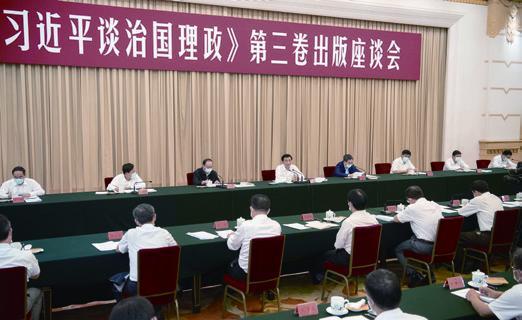Sharing China’s Plans
2020-08-06ByLiQing
By Li Qing

Among the 160,000 titles on display at a recently launched e-library, Xi Jinping: The Governance of China Volume III is one of the most searched for.
The virtual library aims to provide a new platform for international publishing businesses to display their books and continue cooperation, said Du Zhanyuan, President of China International Publishing Group (CIPG), which initiated the program. “It also provides a new channel for international readers to know about diverse cultures and enhance mutual understanding,” he said.
The novel coronavirus disease(COVID-19) has posed a severe challenge for the global publishing industry, shown by the cancellation or postponement of major inter- national book fairs and problems in logistics.
Responding to that, CIPG inaugurated the virtual library on July 24, with a call for solidarity in the industry to tide over diffi culties.
The new online library has attracted publishers from 25 countries and regions exhibiting books in 33 languages.
After two earlier volumes that became bestsellers, the third volume of Xi Jinping: The Governance of China, which came out in June in Chinese and English, has pride of place at the e-library.
Window on China
Published by the Beijing-based Foreign Languages Press, a subsidiary of CIPG, the third volume is a collection of 92 articles, speeches, conversations, instructions and letters by President Xi Jinping between October 18, 2017 and January 13, 2020. In 19 sections it discusses topics ranging from national governance and Chinas all-round opening up to a global community of shared future.
Since taking offi ce as general secretary of the Communist Party of China (CPC) Central Committee in 2012, Xi has put forward many new ideas based on his experience in state governance, which form Xi Jinping Thought on Socialism with Chinese Characteristics for a New Era.
His thoughts play a significant role in promoting the rejuvenation of the Chinese nation, as well as world peace and progress.
“I read the book with keen interest as it expounds Chinas development philosophy and reveals the political aspirations, the concept of governance and great plans of Xi,” former French Prime Minister Jean-Pierre Raffarin said, pointing out that the most common word in the volume is innovation.
A loyal reader of the series, Raffarin said the book offers an opportunity for the international community to learn about China.
The fi rst two volumes, published in 2014 and 2017 respectively, have been distributed in more than 160 countries and regions, Du said at a recent symposium in Beijing.
Over the past six years, CIPG has worked with publishers in 39 countries to launch foreign-language editions for local readers. It has not only showcased the volumes at major international book fairs but also held events such as seminars to introduce them to more readers overseas.
When the third volume was about to be sent to press, Beijing was hit by an upsurge of new COVID-19 cases. CIPG adjusted its printing and distribution plans to meet the demand of readers, Du said. The third volume is selling in more than 3,000 brick-andmortar bookstores across China as well as on online platforms. It is also available in bookstores abroad including in the United States, the UK, France and Japan.
Growth philosophy
This year is the deadline for China to achieve its target of eliminating absolute poverty and building a moderately prosperous society in all respects. One section of the third volume focuses on this topic.“It is a basic requirement and core indicator in our poverty eradication effort that by 2020 we will succeed in delivering the Two Assurances and Three Guarantees for impoverished rural residents,” Xi said at a seminar on April 16, 2019.
Two Assurances and Three Guarantees means ensuring that the rural poor have their food and clothing assured as well as access to compulsory education, basic medical services and safe housing guaranteed.
According to this years government work report, decisive achievements have been made as 11.09 million poor people in rural areas got rid of poverty in 2019 with the poverty headcount ratio down to 0.6 percent, paving the way for China to reach its poverty eradication goal in 2020.
“To complete building a moderately prosperous society in all respects means that all people will benefi t from the fruits of development,” Wen Hong, a professor at the School of Public Administration, South China University of Technology, told Guangzhou Daily. “A decline in the poor population is only part of the story. The success in poverty alleviation also hinges on social development and improvements in peoples livelihood.”
High-quality development, frequently mentioned in the book, is another relevant topic.
“As socialism with Chinese characteristics has entered a new era, Chinas economic development has also embarked on a new phase, the basic feature of which is that our economy is now transitioning from rapid growth to high-quality development,” Xi said at the Central Conference on Economic Work on December 18, 2017. Therefore, China should transform its growth model to cope with problems such as rising labor costs, increasing constraints imposed by lack of resources and the environment, and unsustainable models of extensive development.
Economic development requires an upgraded model as well as adapting to new technologies, Liu Fengyi, head of the School of Marxism at Nankai University, said in an article in Tianjin Daily. “Also, this new model can meet peoples growing needs for products and services supported by a diverse and effi cient supply system.”
As China gets further integrated into the world economy, it is contributing to global sustainable and inclusive development. Today, more than a decade after the 2008 fi nancial crisis, the global economy has reached a crossroads again.
At the Group of 20 Summit on June 28, 2019, Xi advocated his solution.
“We need to vigorously advance structural reform. We need to develop a future-oriented economic structure, policy framework and management system through promoting the digital economy, strengthening connectivity and improving social security,” he said.
He also called for opening up further to embrace opportunities for development and seek win-win outcomes through closer cooperation.
“China is committed to fostering an international environment conducive to openness and collaboration,” Chen Jianqi, a professor at the Party School of the CPC Central Committee, said.
For instance, China has rolled out a plan for developing its southernmost island province Hainan into a free trade port with a focus on tourism, modern services and hi-tech industries. Foreign investors will be treated on par with domestic companies and a negative list will spell out the sectors offlimits for foreign companies in a transparent manner.
